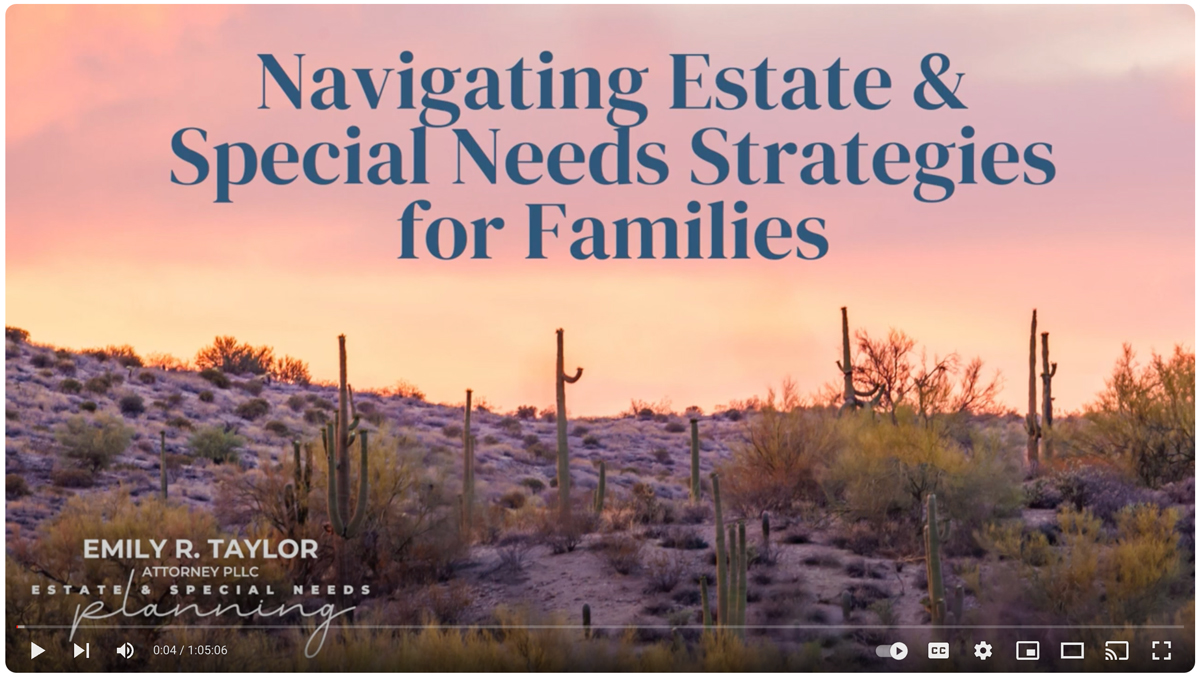


Navigating Estate and Special Needs Strategies for Families in Arizona
Planning for the future can be daunting, especially for families with special needs. However, taking proactive steps can ensure your loved one receives the care and support they need throughout their life. This blog post, inspired by the Youtube webinar “Navigating Estate and Special Needs Strategies for Families in Arizona,” will delve into essential considerations for Arizona families with special needs children.
Understanding Special Needs Trusts:
One of the most critical strategies is establishing a special needs trust. This legal document ensures your loved one can access funds for essential needs without jeopardizing their eligibility for government benefits like Medicaid. Special needs trusts can hold various assets like cash, investments, or real estate.
There are two primary types of special needs trusts:
- Self-settled trusts: Created with the special needs individual’s own assets (if any). These typically do not qualify for needs-based benefits.
- Third-party trusts: Established by a parent, family member, or friend to benefit the special needs individual. These trusts can help maintain eligibility for government benefits.
Choosing a Trustee:
Selecting a responsible and trustworthy individual to manage the trust is crucial. This person will be responsible for making financial decisions aligned with the beneficiary’s needs and ensuring the trust complies with all legal requirements. Consider factors like financial literacy, trustworthiness, and the ability to understand the complexities of special needs care.
Estate Planning Essentials:
Beyond trusts, a comprehensive estate plan is vital. This plan should include:
- Will: A legal document outlining how your assets will be distributed after your death. It’s essential to name a guardian for your special needs child in your will.
- Power of Attorney: This document designates someone to make financial and medical decisions on your behalf if you become incapacitated.
- Healthcare Directives: Also known as living wills, these documents specify your wishes regarding medical treatment in case you cannot make decisions yourself.
Arizona Specific Considerations:
Arizona offers several resources and programs to support families with special needs children. Here are a few key resources:
- The Arizona Achieving a Better Life Experience (ABLE) Program: This program allows individuals with disabilities to save money for qualified expenses without jeopardizing benefits.
- The Arizona Department of Developmental Disabilities (DDD): This agency provides various services and supports for individuals with developmental disabilities.
Taking Action:
Consulting with a qualified estate planning attorney experienced in special needs cases is essential. They can guide you through the legal complexities involved and tailor a plan that meets your family’s unique needs.
Conclusion:
Planning for your loved one with special needs can feel overwhelming. However, by taking proactive steps, you can ensure they have the resources and support they need to live a fulfilling life. Remember, you’re not alone in this journey – Arizona offers a wealth of resources and professionals to guide you through the process.
Taking the time to establish a special needs trust, create an estate plan, and explore state-specific programs can significantly benefit your loved one’s future. By planning ahead, you can provide peace of mind for yourself and ensure your loved one receives the care and support they deserve.



